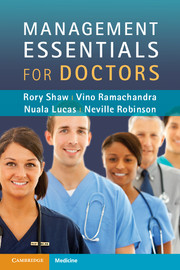Book contents
- Frontmatter
- Contents
- Contributors
- Foreword
- Preface
- Acknowledgements
- Section 1 Core knowledge
- Section 2 Core skills
- Chapter 12 Chairing meetings
- Chapter 13 Educational supervision
- Chapter 14 Effective delegation
- Chapter 15 Leadership styles
- Chapter 16 Leadership competences
- Chapter 17 Mentoring
- Chapter 18 Time management
- Section 3 Important bodies
- Section 4 Information, evidence and research
- Section 5 Money
- Section 6 NHS structures
- Section 7 Operations
- Section 8 Safety and quality
- Section 9 Staff issues
- Index
- References
Chapter 17 - Mentoring
Published online by Cambridge University Press: 05 March 2012
- Frontmatter
- Contents
- Contributors
- Foreword
- Preface
- Acknowledgements
- Section 1 Core knowledge
- Section 2 Core skills
- Chapter 12 Chairing meetings
- Chapter 13 Educational supervision
- Chapter 14 Effective delegation
- Chapter 15 Leadership styles
- Chapter 16 Leadership competences
- Chapter 17 Mentoring
- Chapter 18 Time management
- Section 3 Important bodies
- Section 4 Information, evidence and research
- Section 5 Money
- Section 6 NHS structures
- Section 7 Operations
- Section 8 Safety and quality
- Section 9 Staff issues
- Index
- References
Summary
Mentoring is a very old concept in a new guise. It can be traced back to Greek mythology when Odysseus entrusted his son Telemachus to his old and trusted friend Mentor, who acted as a wise counsellor and helper to the youth. Mentoring then became common practice in the time of the guilds and trade apprenticeships when young people who had acquired technical skills often benefited from the patronage of more experienced and established professionals.
There are many opinions of what mentoring is or should be about. The traditional view is that it is based on a longlasting, usually spontaneous, relationship in which a more skilled or experienced person (the mentor) serves as a role model and supports, guides, advises, teaches, encourages, counsels and befriends a less skilled or experienced person in need of help for the purpose of promoting their professional and personal development. In recent years, newer models of mentoring have been developed where the emphasis is on mutual support rather than the flow of help in a single direction from mentor to mentee, and this is known as co-mentoring. One of the key ingredients in all mentoring arrangements is the skill of ‘active listening’.
- Type
- Chapter
- Information
- Management Essentials for Doctors , pp. 47 - 49Publisher: Cambridge University PressPrint publication year: 2011



